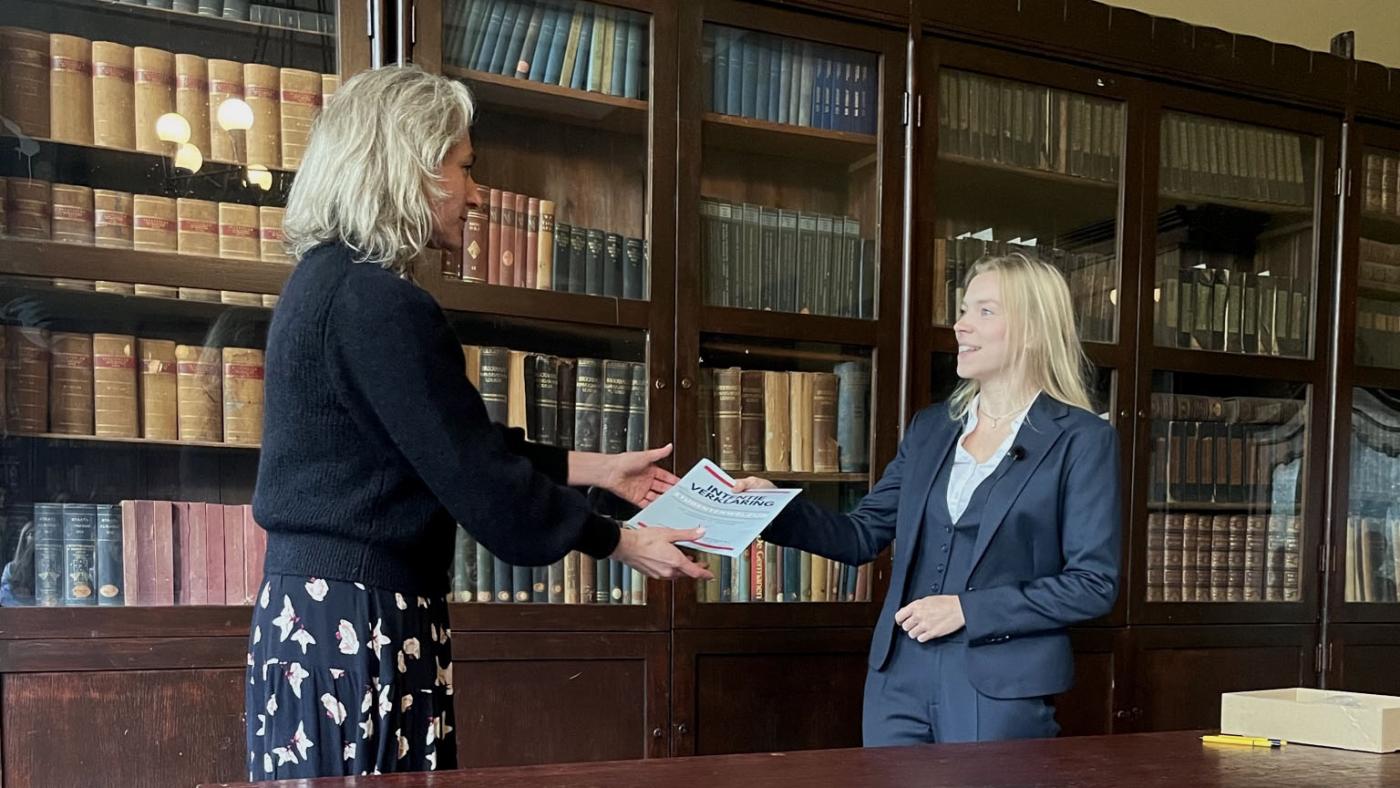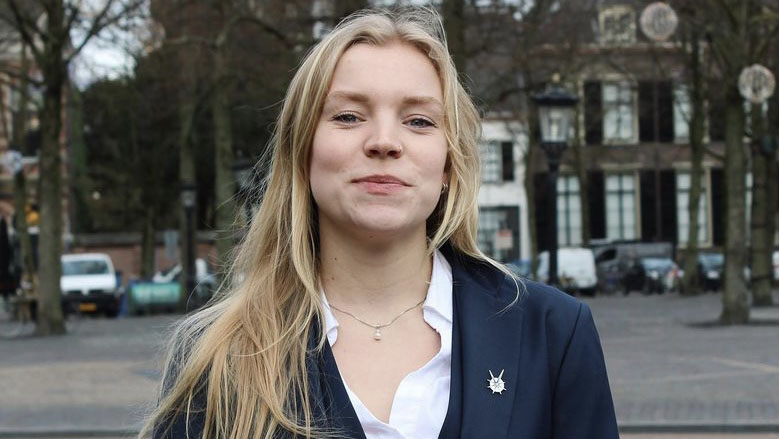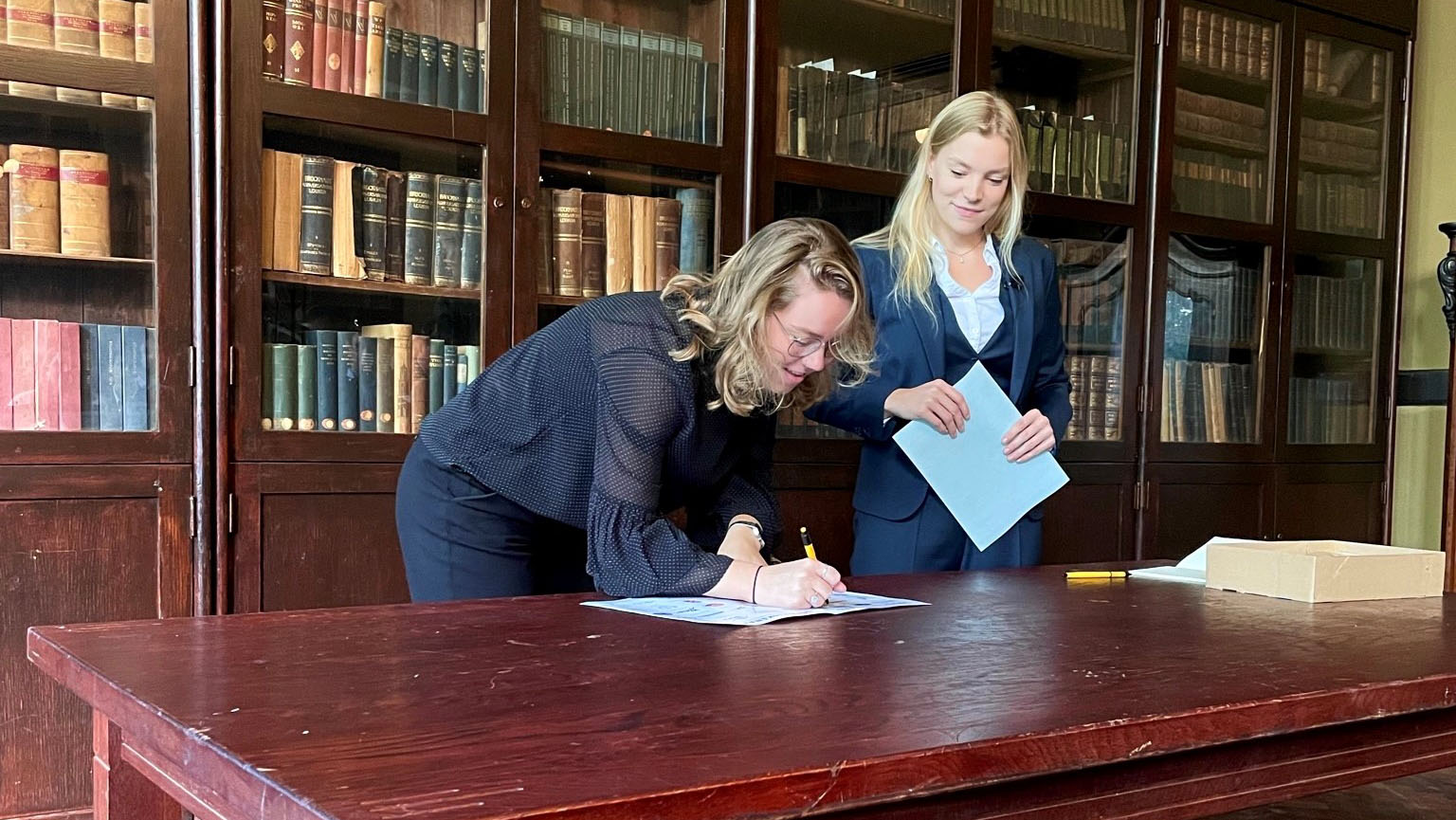Utrecht student associations vow to combat transgressive behaviour

The letter of intent (document in Dutch, Ed) is an initiative of Melanie Pieper, who was the chair of student union Vidius last year. A total of 58 student associations, study associations, sports associations, and cultural associations have signed it.
After collecting all the signatures, Pieper handed over the letter to Utrecht's education alderman Anne Klein this Friday, at the Utrecht Student Corps society, located on Janskerkhof square.
"With this initiative, we hope that more students become aware of what transgressive behaviour is and what its consequences can be," said the Master's student of Spatial Planning. "But this is also a message to those outside the university, to show that the Utrecht student community takes this topic very seriously."
How did the idea for this letter come about?
“It was directly influenced by the Amnesty International report revealing that one in ten women are raped during their college years in the Netherlands. In addition, the report shows that victims often don't know where to turn to for help. After the report came out, the municipality approached me to ask how this issue plays out in the Utrecht student community.
That's when I realised that I hadn't done anything related to student safety as Vidius' chair, even though it was a top priority for me when I took the role. Because of all the issues surrounding the pandemic, most of my attention was turned to the development of the health card for students. But that's not an excuse.
I then took to discussing the issue with one of Orca's former chairs, since the rowing association already had some experience with the topic: they organised the Safety Week. Those talks resulted in the letter of intent."
In your view, why is this topic important?
“Unfortunately, I've also had unpleasant experiences of a sexual nature. It didn't happen within a student association, but I would really like to avoid others from going through what I've been through. That's why I wanted to take advantage of Vidius' contact list."
When a student organisation signs a letter of intent, what does that mean?
“It means that we'll do our very best to make sure that students in Utrecht have a pleasant time in college. When students experience inappropriate behaviour, sexual harassment, discrimination, aggression or something of that sort, their mental health is at stake. So student associations would like to avoid that from happening.
By signing the letter, the associations are making five commitments. First, they promise to organise something at least once a year to discuss inappropriate and uncomfortable situations. It could be a dedicated day or week, or a yearly activity or gathering for freshmen.
Secondly, the associations must have a person that will be a trusted point of contact for victims, and students must know where to find this person. Lastly, the associations must have or point to a code of conduct that clearly states that transgressive behaviour will not be tolerated."
Article continues after the picture. 
Melanie Pieper: "Associations can't avoid wrong things from happening, but they can raise awareness among their members." Photo: courtesy of Pieper.
But was this really that necessary? Are Utrecht-based associations so disorganised in that regard?
“No,quite the opposite. Compared to other cities, the associations in Utrecht already pay a lot of attention to this topic and they've already done a lot. The university also offers them a lot of support.
But it's a good thing when associations can learn from each other, which happens now because they've got to reflect on the issue and discuss what they're going to do about this letter of intent. For example, some associations already have a designated person that students can turn to, but it's a member of the council, which doesn't work very well, and they're realising that now. Rowing association Triton has also improved their code of conduct because of the letter of intent, which is amazing.
“The associations cannot keep wrong things from happening, but they can make sure that their members are more aware of their actions and words, and that victims receive all the help they need. That doesn't require complex measures."
Why wasn't the letter signed by all Utrecht-based student associations?
“Certain associations simply didn't reply. I don't know what that means. Maybe they didn't see it or notice it. But I still hope they join us.
Other associations claim that this topic does matter to them, but they don't want to make commitments like organising specific activities. That, I do understand. The associations already have a lot on their plate and sometimes have other priorities.
But I'm glad that most of the big student associations in Utrecht have signed the letter. Initially, we were thinking about sending them an 'agreement', but the associations linked to the Federation of Utrecht Social Associations (FUG in the Dutch acronym) thought that was a bit too much. They have to comply to all sorts of codes and agreements, so they're not exactly eager to assume yet another obligation. But when we changed the name of the document to 'letter of intent,' and explained what we meant with our initiative, then they were really enthusiastic."
Article continues after the picture.
 The Student Association for International Relations also signed the letter of intent on Friday.
The Student Association for International Relations also signed the letter of intent on Friday.
Student association Veritas has recently launched its own awareness campaign on inappropriate behaviour, called #thisishowwedoit. Is that just a coincidence?
“I don't know, actually. I was surprised, but really happy about it. It's nothing but positive that this becomes a conversation topic among as many students as possible. The same goes for the campaign 'Let's Talk About Yes,' launched by Amnesty International across university cities in the Netherlands. To me, the most important thing is raising awareness. I know so many students who have had the same bad experiences as I have, so it's nice, to say the least, to be able to talk about this and be heard."
So, what now? What are your future steps?
“Now I'll try to promote the letter of intent in other university cities, where they look at what we've accomplished in Utrecht with admiration.
Personally, I would like the letter to become a sort of certificate of quality for associations. They would use it to show that they have got their stuff together when it comes to combatting transgressive behaviour. But that's more of a long term project. First, the initiative must come from associations themselves, and they're displaying that with this letter."